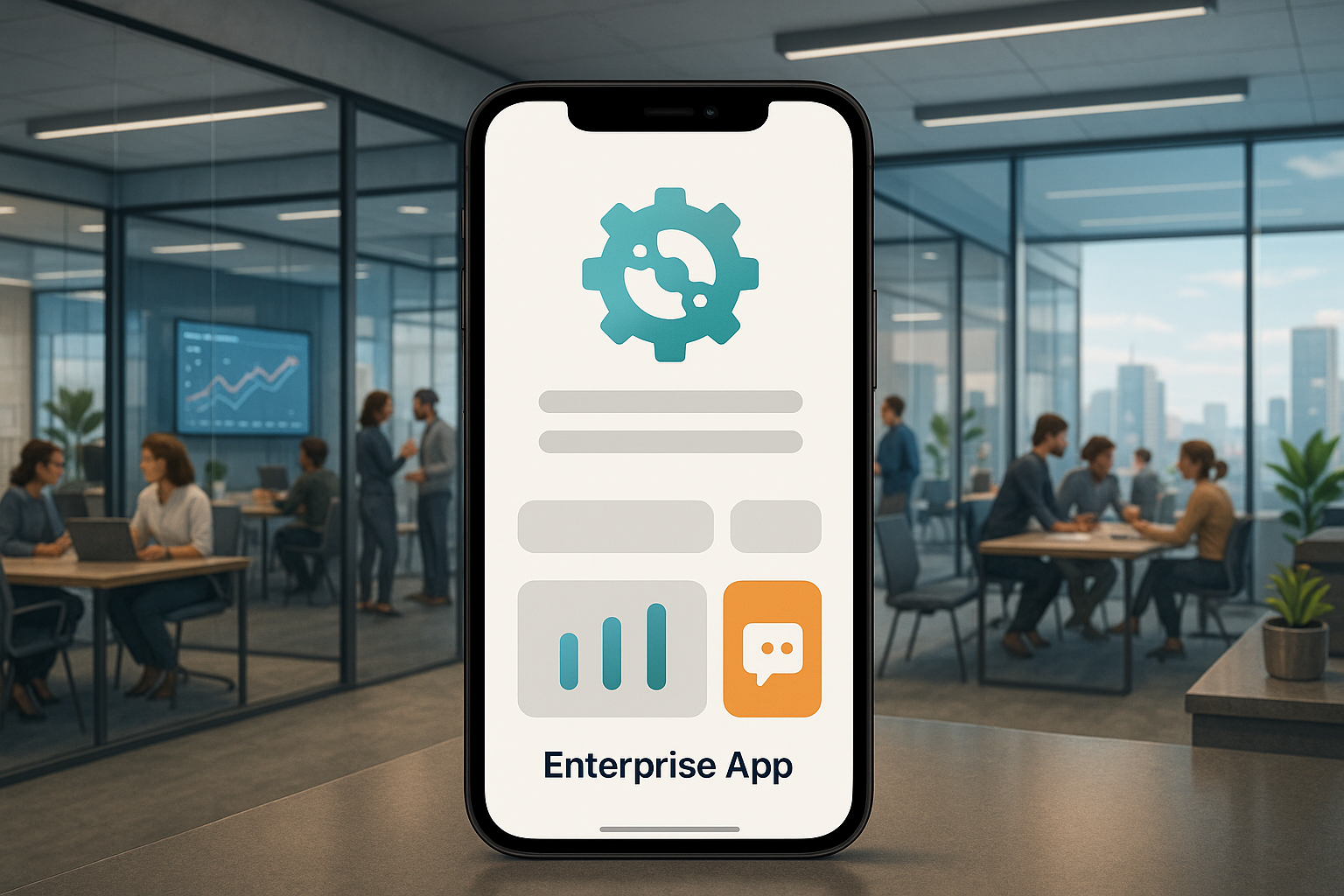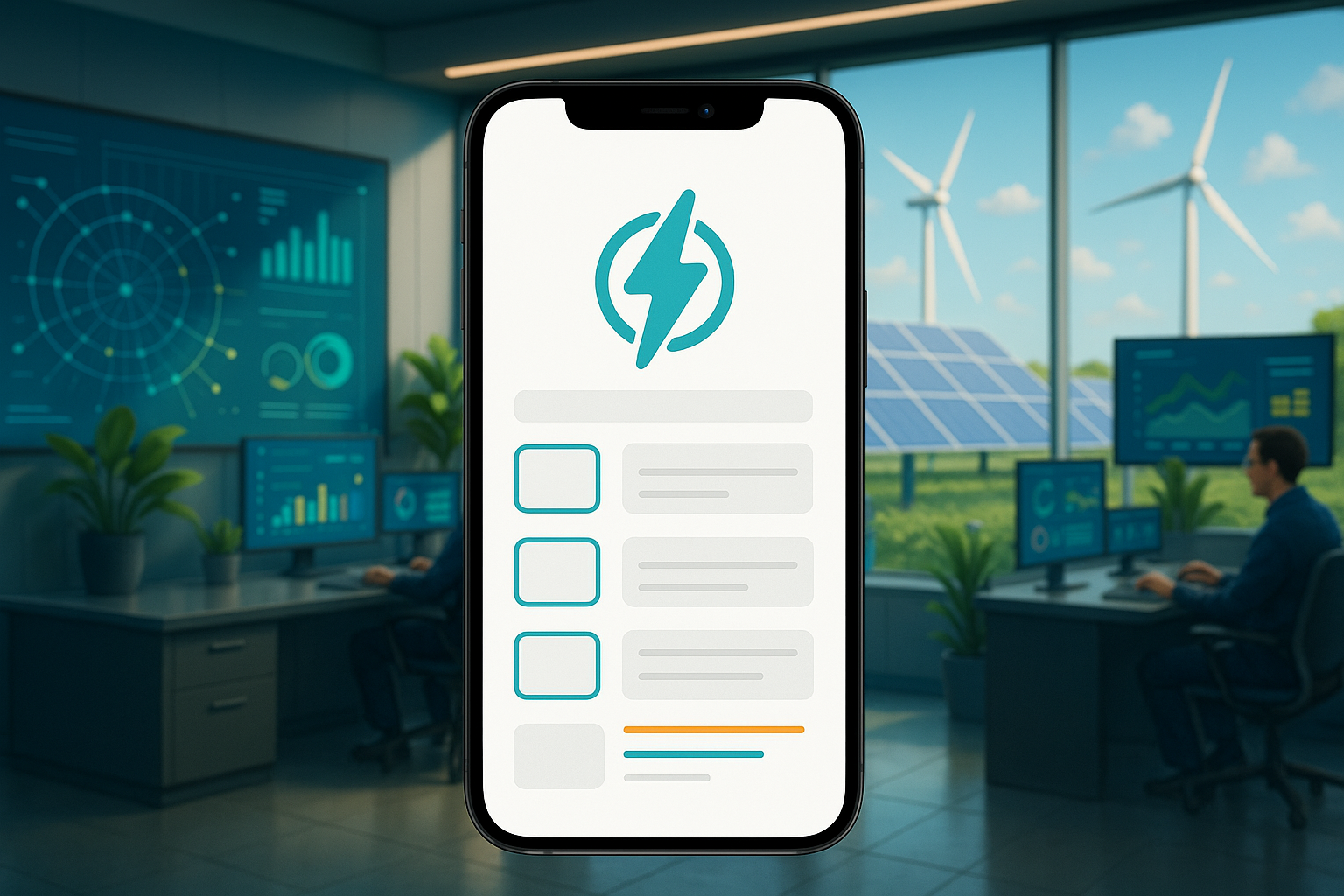Navigating the Complex World of Enterprise App Development
Developing a powerful enterprise application is a formidable task, far more complex than building a standard consumer app. These large-scale software solutions are the engines of modern business, designed to streamline operations, automate processes, and foster collaboration across an entire organization. However, the path to a successful enterprise app is paved with significant challenges: integrating with decades-old legacy systems, ensuring ironclad security for sensitive data, managing constantly shifting requirements, and finding the specialized talent required to build a scalable, robust solution. An internal team can quickly find themselves overwhelmed, leading to project delays, budget overruns, and a final product that fails to meet critical business needs.
This is where a strategic partner becomes invaluable. In this comprehensive guide, we will delve into the world of enterprise application development. We will define what constitutes an enterprise app, explore the common types that power today’s leading companies, and break down the substantial challenges that make in-house development so difficult. We will also provide a realistic look at potential costs and present the top companies in the software development space.
As a top US AI-powered app development firm with over 20 years of experience, we at MetaCTO specialize in transforming ambitious ideas into market-ready applications. We understand the unique pressures and complexities of enterprise-level projects. From concept to launch and beyond, we provide the expert guidance and technical horsepower to build, grow, and monetize your application, ensuring it not only functions flawlessly but also drives significant business value.
What is an Enterprise Application?
At its core, an enterprise application is a sophisticated, comprehensive, and large-scale software solution designed specifically for the needs of a large organization, or enterprise. The primary goal of any enterprise application is to improve the overall efficiency, productivity, and effectiveness of an organization’s core business processes. These applications are built to streamline and automate the various, often complex, operations that keep a business running, reducing the need for manual human effort and ensuring consistency across different workflows and departments.
While “enterprise applications” is the general term for these solutions, “enterprise application software” (EAS) refers more specifically to the actual software types used to support these enterprise-level functions. In practice, both terms describe software that is focused on two critical characteristics: scalability and integration.
- Scalability: Enterprise applications must be able to handle a massive number of users and transactions simultaneously. They are architected to accommodate the needs of a large, growing organization without faltering in performance.
- Integration: A key function of enterprise software is to integrate seamlessly with an organization’s existing systems, databases, and other enterprise apps. This creates a centralized, unified platform for data management, workflows, and resources, which enables better coordination and cooperation of work across the entire organization. This ability to interact with multiple software services and platforms is often achieved through the use of APIs, plug-ins, and extensions.
Enterprise applications can range from relatively basic content management systems (CMS) to highly complex software that automates mission-critical tasks. They are often built with multiple modules and components to address various aspects of business operations and are designed to be customizable to meet the specific needs of a business. This customization is usually achieved through dedicated application development services. Through enterprise application software development, it is even possible to reach beyond the enterprise itself, allowing a business to link with its suppliers, partners, and customers. This connectivity offers a more comprehensive view and greater control of its processes, creating immense potential for increased efficiency.
Why In-House Enterprise App Development is So Difficult
Building an enterprise application is fundamentally more complex than creating a simple eCommerce app for a small business. For an enterprise, the stakes are higher, the data is more sensitive, and the web of interconnected systems is far more intricate. Attempting this monumental task in-house presents a unique set of severe challenges that can derail a project before it ever gets off the ground.
Technical and Architectural Hurdles
The technical foundation of an enterprise app must be flawless, and achieving this is a significant challenge.
- Scalability: An enterprise app that cannot scale with the business is destined for failure. Making an application properly scalable requires deep knowledge of its complex structure, the underlying technologies, and the resource allocation necessary to support growth. One cannot simply look at competitors’ products, as these internal systems are not publicly visible.
- Legacy System Integration: Many large enterprises run on legacy systems with monolithic architectures built years, or even decades, ago. These outdated systems can become a major bottleneck. Integrating them with modern enterprise applications and third-party APIs is an incredibly complex task. Often, it requires a complete legacy system upgrade and a transformation to a more flexible, microservice-based architecture before any new development can even begin.
- Data Management and Performance: Enterprise software generates, processes, and stores massive amounts of data. A core challenge is ensuring this data can be retrieved quickly and analyzed effectively. Without a carefully elaborated application architecture and infrastructure, the software will not be as efficient or fast-working as it needs to be, frustrating users and hindering productivity.
Security and Compliance
Security is not just a feature; it is a fundamental requirement and one of the biggest challenges in enterprise application development.
- Protecting Sensitive Data: Enterprise software often handles highly sensitive information, including proprietary company data and private customer data. This information is extremely valuable and must be protected by advanced technical means. A single vulnerability in one application could potentially compromise the security of the entire corporate network.
- Regulatory Compliance: The implementation of security measures is usually governed by specific regulations and industry standards. Adhering to these complex compliance frameworks while building a functional application poses a significant challenge for development teams.
Project Management and Resource Challenges
Beyond the code itself, managing the development process within a large organization presents its own obstacles.
- Constantly Changing Requirements: Business needs evolve. For a development team, constantly changing requirements are perhaps the most difficult challenge to manage. When a complex enterprise application is halfway complete, even a minor change in a requirement can lead to significant changes in the code, requiring extensive re-testing and rework. This will very likely affect project deadlines, the budget, and even the motivation of the team.
- Finding Specialized Talent: It is incredibly challenging to find tech experts fast for an enterprise project, especially when hiring for an in-house team. Not all software developers are experienced in enterprise-level development or in a specific industry. The recruitment process to find perfectly fitting specialists can take weeks or even months, bringing a project to a standstill.
- Communication Gaps: Communication breakdowns between business and IT teams are common and costly. These gaps often arise from differences in language, priorities, and a fundamental misunderstanding of business requirements. This can lead to delays, rework, and an inefficient use of company resources.
- Adapting to Agile Development: Modern development thrives on agile methodologies. However, adapting to agile requires a significant cultural shift within a traditional organization. It involves breaking down departmental silos, empowering teams to make decisions, and embracing a culture of change and iterative development—a difficult transition for many large enterprises.
Navigating these obstacles requires more than just a team of developers; it requires a seasoned partner with a proven process. At MetaCTO, we provide the strategic oversight and deep technical expertise needed to overcome these challenges. Our Fractional CTO services, for instance, offer the high-level guidance to build a technology roadmap that aligns with your business goals, ensuring your project stays on track and delivers tangible results.
Common Types of Enterprise Applications
Enterprise Application Software (EAS) comes in many forms, each designed to address a specific set of business functions. The integration of these various systems creates the cohesive digital ecosystem that modern enterprises rely on. Here are some of the most common types of enterprise applications.
Enterprise Resource Planning (ERP)
ERP systems are the backbone of many organizations. They integrate with the company’s underlying operating system to manage and automate core business processes across finance, human resources, procurement, and manufacturing. By creating a single source of truth for essential data, ERP systems break down information silos and provide a holistic view of the business.
- Examples: Microsoft Dynamics 365, Oracle® Cloud ERP, SAP® ERP.
Customer Relationship Management (CRM)
CRM software is focused on managing and analyzing all customer interactions and data throughout the customer lifecycle. The goal is to improve business relationships, assist in customer retention, and drive sales growth. CRMs help streamline sales processes, manage marketing campaigns, and ultimately enhance customer satisfaction.
- Examples: HubSpot, Salesforce, IBM watsonx™ Assistant.
Supply Chain Management (SCM)
SCM systems are designed to optimize all the activities involved in an end-to-end supply chain. This includes managing procurement of raw materials, overseeing manufacturing processes, and coordinating logistics and distribution of final products. Effective SCM software helps businesses reduce costs, improve efficiency, and respond faster to market changes.
Human Resource Management (HRM)
HRM software streamlines all processes related to an organization’s human capital. These applications are designed to enable users to easily manage recruitment and hiring, employee onboarding, payroll and benefits administration, and performance management.
- Examples: Oracle® Fusion Cloud HCM, SAP® SuccessFactors HXM Suite, Workday® HCM.
Business Intelligence (BI) and Analytics
BI tools provide powerful analytics and reporting capabilities. They collect and process large amounts of data from internal and external systems to help businesses analyze trends, gain actionable insights, and make more informed, data-driven decisions.
Content Management and Collaboration
This category includes several types of applications designed to manage information and facilitate teamwork.
- Content Management Systems (CMS): These platforms enable the creation, modification, and management of digital content, primarily for website management, document collaboration, and knowledge sharing.
- Enterprise Content Management (ECM): ECM systems are more robust and are used for the storage, organization, and retrieval of all types of unstructured content, including documents, images, emails, and multimedia files.
- Collaboration and Communication Tools: This includes project management software, internal intranet platforms, and communication tools that facilitate document sharing, real-time communication, and project management among teams.
Other Key Enterprise Systems
- Automated Billing Systems: These systems integrate directly into an organization’s accounting system to monitor budgets, expenses, and profits, automating the entire billing cycle.
- E-commerce and Sales Platforms: These platforms support all aspects of online sales and transactions, including inventory management, order processing, and customer interactions, enabling retailers to offer seamless online shopping experiences.
- Learning Management Systems (LMS): An LMS is used for employee training and development. These applications help organizations manage and deliver training programs, track employee progress, and assess learning outcomes.
- Workflow Automation Systems: These systems streamline and automate repetitive business processes, reducing the need for manual effort, minimizing errors, and improving overall operational efficiency.
How Much Does Enterprise App Development Cost?
Estimating the cost of an enterprise application is complex, as the final price depends on a multitude of factors, including the application’s complexity, the number of features, the extent of third-party integrations, and the level of security and compliance required.
However, to provide a general baseline, an enterprise app development project budget can be estimated at $100,000+.
This figure represents a starting point. A large-scale, highly customized application, such as a bespoke ERP or CRM system with advanced AI capabilities and integrations into multiple legacy systems, could easily run into the high six or even seven figures. The cost reflects the immense effort required for discovery and planning, UI/UX design, backend and frontend development, rigorous testing, and ongoing maintenance and support. Partnering with an experienced firm like MetaCTO can help you develop a clear project roadmap and budget, ensuring there are no surprises along the way. Our Rapid MVP Development approach, for example, allows businesses to launch a core version of their product to validate the concept and secure funding before committing to a full-scale build.
Top Enterprise App Development Companies
Choosing the right development partner is critical to the success of your enterprise application. The market is filled with excellent companies, from large-scale software giants to specialized development agencies. Based on market leadership, experience, and capability, here are some of the top names in the industry.
1. MetaCTO
As a premier US-based AI-powered mobile app development agency, we at MetaCTO bring over 20 years of experience to every project. With a track record of over 120 successful projects and more than $40 million in fundraising support for our clients, we position ourselves as more than just developers; we are strategic partners dedicated to your success.
We handle every step of the process, from initial concept to launch and beyond. Our expertise in AI development allows us to integrate cutting-edge technology into your application, delivering custom chatbots and advanced machine learning models that enhance efficiency and drive innovation. Our process is designed to go to market faster and slash costs, transforming your big idea into an app that exceeds expectations. We guide you through validation, building, growth, monetization, and the long-term evolution of your product, ensuring your app stays competitive in a fast-moving market.
Other Leading Software Companies
The enterprise software landscape is dominated by several major players who provide foundational platforms and services. The following table, with data derived from the 2023 Forbes list for the “Software & Programming” industry based on market capitalization, highlights some of these leaders.
| Rank (Forbes 2023) | Company | 2024 Revenue (US$) | 2024 Market Cap (US$) | Headquarters |
|---|---|---|---|---|
| 1 | Microsoft | $237 billion | $3,123 billion | Redmond, Washington, US |
| 2 | Alphabet | $318 billion | $2,178 billion | Mountain View, California, US |
| 3 | Oracle | $55.78 billion | $388.36 billion | Austin, Texas, US |
| 4 | Salesforce | $34.9 billion | $277.1 billion | San Francisco, California, US |
| 5 | SAP | $34.5 billion | $224.7 billion | Walldorf, Germany |
| 6 | Adobe | $19.9 billion | $216.6 billion | San Jose, California, US |
| 8 | ServiceNow | $9.48 billion | $156.84 billion | Santa Clara, California, US |
| 9 | IBM | $62.07 billion | $155.27 billion | Armonk, New York, US |
| 10 | ADP | $18.9 billion | $103.28 billion | Roseland, New Jersey, US |
| 11 | Fiserv | $19.43 billion | $89.35 billion | Brookfield, Wisconsin, US |
| 12 | Synopsys | $6.14 billion | $86.45 billion | Mountain View, California, US |
| 13 | Crowdstrike | $3.06 billion | $84.12 billion | Austin, Texas, US |
| 16 | Dassault Systèmes | $6.52 billion | $54 billion | Vélizy-Villacoublay, France |
| 17 | Palantir Technologies | $2.33 billion | $48.46 billion | Denver, Colorado, US |
| 18 | Autodesk | $5.45 billion | $47.66 billion | San Rafael, California, US |
| 19 | Paychex | $5.2 billion | $45.23 billion | Rochester, New York, US |
| 20 | Snowflake Inc. | $2.8 billion | $54.1 billion | Bozeman, Montana, US |
| 47 | Atlassian | $3.9 billion (2023) | $40.9 billion (2023) | San Francisco, California, US |
| 48 | MongoDB | $1.7 billion (2023) | $25.6 billion (2023) | New York City, New York, US |
Note: Data for some companies reflects earlier years as per the provided facts.
Conclusion: Build Your Next Enterprise App the Right Way
We have journeyed through the intricate landscape of enterprise applications, defining what they are and exploring the diverse types that power modern organizations, from ERP and CRM systems to workflow automation and business intelligence tools. We’ve also confronted the stark realities and significant challenges of in-house development—the technical complexities of scalability and legacy integration, the non-negotiable demands of security, and the project management hurdles of shifting requirements and resource gaps. The estimated starting cost of over $100,000 underscores the serious investment required for such a project.
Embarking on enterprise app development is a high-stakes endeavor that demands expert navigation. The challenges are numerous, but they are not insurmountable. With the right strategy and the right partner, you can build a powerful, scalable, and secure application that transforms your business operations and provides a significant return on investment. Don’t let your project become another statistic of delays and budget overruns. Start strong, build smart, and scale fast.
If you are ready to turn your vision for an enterprise application into a reality, we are here to help.
Talk with an Enterprise app development expert at MetaCTO today and let’s build your app the right way, from day one.






